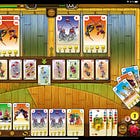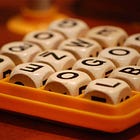Can a game be good?
My attempt to compare Racko and My City, two board games that have about as little to do with one another as you could possibly imagine
We were finishing our 18th game of My City, a legacy1 style board game where you’re trying to fill your board with various tetris pieces in order to build a small town, when my wife asked me “Is this game good?”2 My response was, “Well some reviewers I respect really liked it.”
So that was a cop out.
And the truth is, I’m honestly not sure.
This got me thinking about Racko, a game that I really enjoyed playing with family when I as a kid. Racko is a game about ordering a set of 5 cards in your hard from lowest to highest without being able to move the position they were dealt in your hand.
Here are their relative Board Game Geek rankings:
Games aren’t like other art
What separates games from other art forms, for me is in your ability to appreciate other art whether or not you like it. It is possible for me to understand the technique, the challenge, the craft of a piece of written or visual art. I can learn about its history and I can appreciate what it meant for the creator to put together such a work even if it doesn’t speak to me.
It is much harder to do that with games. Harder to the point of being nearly impossible. Games feel more like chiseling off a piece of the math of the universe and capturing the magic inside a box.3 And maybe, when you take a peak inside that box maybe that piece of the universe speaks to you and maybe it doesn’t.
And if that piece of the universe doesn’t speak to you it’s much harder (maybe impossible?) to see the artistry behind it. Which makes evaluation… much harder.
Ok, but like, what about the actual games
I liked and played Racko way before I knew about games like Bohnanza or Scout.
Racko feels like the simplest implementation of those hand management games. It has absolutely zero pretension. All you have to do is shuffle and deal and you’ve got a game going. Every turn you pick up a card like Gin Rummy and replace it with one of the cards in your hand. You… barely have to think while playing it.
Does that make the game bad?
Conversely, My City is a game that builds on top of a rich tradition of tile laying and tetris-style tile layers (like Barenpark or Patchwork or New York Zoo). It adds all of this stuff on top of it like the legacy style game, and the different criteria for tile laying.
Does that make the game good?
The answer to both is no. Racko is this really simple set of ideas that gets obviously outstripped by other newer games and My City is a game that feels built for people who really enjoy the narrative of the story that evolves over the course of multiple sessions.
How I Think About Games
I think there are two primary ways of interacting with games. One is because you choose to play them and the other is how you remember them.
This is important, I think, because unlike other types of media, games can and will replace each other. Types of art might change with fashion or opinions, but the Impressionists didn’t “replace” Naturalists. They iterated and evolved. But, in a lot of ways a game like King of Tokyo replaces Yahtzee. They are very very similar slices of the universe to cut off from one another, and it’s very very unlikely you’ll pick both.
Choosing to Play Them
Would I choose to play either of these games again, or recommend them? No.4 In both cases, as I’ve mentioned, there are other games I would recommend. Bohnanza instead of Racko and New York Zoo instead of My City.
Opening those boxes again I would suspect I just wouldn’t feel the magic again as it were, if I had to guess. So in this sense are they good? Probably not.
Remembering Them
Racko ironically I do have stronger memories of. I can remember game nights with my family, the sky dark outside sitting around a table at a couch playing the game. I remember feeling like there was much more strategy and skill involved than I do now. And I remember the clack and creak and slide of glass on plastic as the card holders shifted around. I wouldn’t say that part is a pleasant memory, but it certainly sticks. But more than that I’m not sure Racko lent itself to any memory. I certainly don’t remember exciting interplay that led to moments that wedged themselves in my mind. Unlike Boggle, where I had several distinct memories.
And for My City, the answer is also no. Both because the narrative of the story (the individual mechanics that changed as the game evolved) wasn’t particularly interesting and it didn’t lend itself to moments that made me feel especially clever or especially appreciative of a move my opponent made.5 For all of the stuff going on it resolves down into a relatively smooth and easy experience. I suspect, as a player, if I brought more to it I would’ve gotten more out of it, but I also wasn’t compelled to do that.
So Are They Good?
For me, right now. The answer is no. Am I allowed to say no? I’m sure hordes of people on both sides of the casual or complex gaming spectrum. But that’s also a deeply personal no. There isn’t enough about either game that feels personal, unique, or evolutionary to make me feel otherwise.
More and more I’m becoming convinced that the craft of game design of game recommendations and of game appreciation is less about understanding the skill of the artistry and more appreciating the entire lifecycle of events that led to the creation of that experience and that game. It’s not that because everyone comes from different perspectives it’s impossible to say if a game is “good”, it’s understanding the why behind what makes someone appreciate a game.
And maybe that’s how it’s always been with art. But I think the fun part of games is getting the chance to explain that thing, to walk through and understand why a slice of the universe speaks to you in a particularly interesting or inspiring way. And maybe, hopefully, to understand each other just a bit better.
This means a board game experience that’s played out over multiple game sessions instead of a single repeatable
Setting aside for a second whether or not you can label a piece of art as “good” or “bad”, which I at least get into whenever I start writing about this stuff. I think “good” is more of a heuristic for “Do you want to play this again?”
I still think games can be expressions of an individual’s viewpoint.
We will probably still finish My City because games are so quick and we want to see where the end leads us.
I will say there was on really neat mechanic that felt lost. It was the idea of having a marker that would score you bonus points every time you placed a piece on an adjacent square. That felt like a spark, but it never quite lit into a flame.





